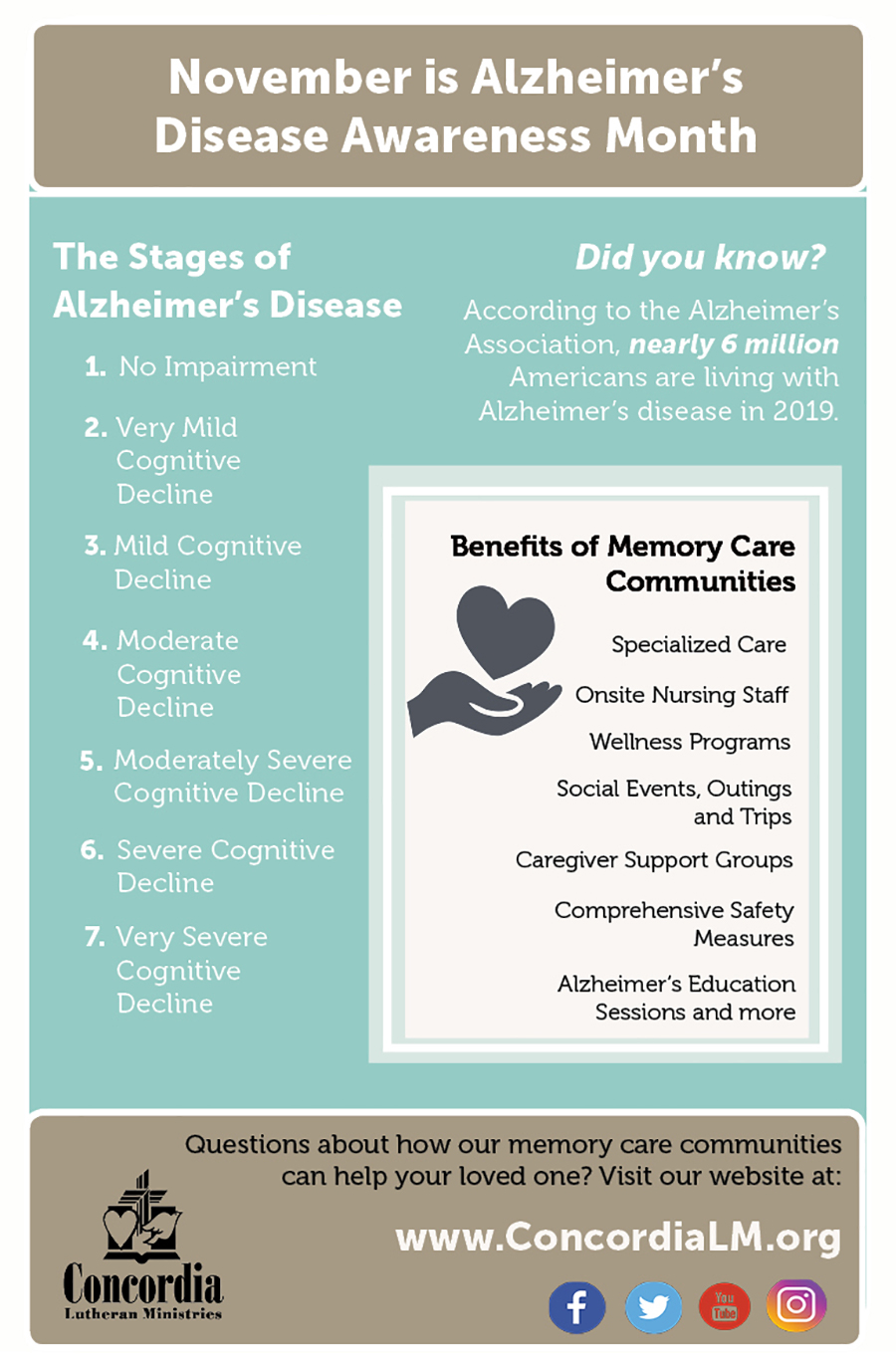The Stages of Alzheimer’s Disease: What to Expect and How Memory Care Can Help

Alzheimer’s disease is a form of dementia and a progressive disease that slowly impairs an individual’s ability to think clearly, remember information, communicate with others and eventually, care for themselves independently. According to the Alzheimer’s Association, nearly 6 million Americans are living with Alzheimer’s disease this year.
If your senior loved one has recently received an Alzheimer’s diagnosis, it can be overwhelming and may cause you to feel uncertain about what to expect. Although every individual and situation is unique, understanding the typical stages, symptoms and progression of Alzheimer’s can help you determine if your loved one would benefit from professional memory care. As always, be sure to consult with your physician or health care professional before making any decisions.
Stages of Alzheimer’s Disease
According to the Alzheimer’s Association, Alzheimer’s disease progresses in seven stages. Symptoms often develop slowly, so it might be difficult to detect a change in your loved one until certain behaviors like misplacing household objects, forgetting names of friends and family members, etc., occur more frequently. Below are the seven stages of Alzheimer’s, which typically occur over an extended period (years between each stage) depending on individual health factors.
Stage One (No Impairment) – During this stage, there are no signs or symptoms that would indicate an Alzheimer’s diagnosis is present.
Stage Two (Very Mild Cognitive Decline) – Stage two marks the beginning of typical forgetful behaviors and actions. However, these behaviors are commonly mistaken for age-related memory loss, and remain undetectable by loved ones or physicians.
Stage Three (Mild Cognitive Decline) – During this stage, forgetful behaviors will begin to escalate, and family members and friends may start noticing impaired cognition. Often, seniors in this phase will have difficulty finding the right words to use during conversations as well as recalling names of new acquaintances.
Stage Four (Moderate Cognitive Decline) – Symptoms are apparent in this phase. Seniors experiencing this stage of Alzheimer’s will have poor short-term memory, and have difficulty with the instrumental activities of daily living (IADL) which include managing finances, shopping, preparing meals, maintaining a home and more.
Stage Five (Moderately Severe Cognitive Decline) – During this Alzheimer’s stage, your loved one may need help with some activities of daily living (ADL), like dressing, and may not be able to recall basic information or everyday details. However, many individuals are still able to carry out certain activities of daily living, like basic hygiene, on their own.
Stage Six (Severe Cognitive Decline) – Seniors in this stage will exhibit significant confusion. They will not be able to recognize people around them except close family members and friends. During this stage, they may forget details of their own personal history or identity and need extensive help with activities of daily living.
Stage Seven (Very Severe Cognitive Decline or Late Dementia) – In the final stage of Alzheimer’s, your loved one may lose the ability to communicate and may not be able to recognize their surroundings or family members. Complete assistance with activities of daily living will likely be needed. Individuals in this stage are completely unaware of their condition.
How Memory Care Can Help
During the progression of Alzheimer’s disease, there may come a point when your loved one would benefit from professional caregiving assistance. Memory care facilities not only provide specialized staff, programs and amenities, they also offer extensive resources to family caregivers. Services and amenities available to residents and families typically include:
• Specialized care
• Onsite nursing staff
• Wellness programs
• Social events, outings and trips
• Comprehensive safety measures
• Caregiver Support Groups
• Alzheimer’s education sessions and more.
To learn more about how our memory care facilities, personal care communities, long-term nursing care and adult day services can benefit your senior loved one, visit the locations page of our website to find a Concordia community near you. You can also call our headquarters for more information at 724-352-1571 or message us through our contact form 24 hours a day.
Get Updates From Concordia
There is always a LOT happening at Concordia! Would you like to stay up-to-date with our news and events? Sign up for our monthly e-newsletter here.
